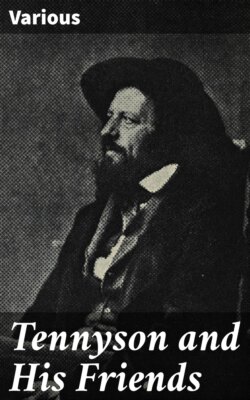Читать книгу Tennyson and His Friends - Various - Страница 14
На сайте Литреса книга снята с продажи.
Оглавление“You took my criticism on ‘Maud’ like an angel,” he writes in 1856, “which was very good indeed of you. I wish only you could be as glad whenever I thoroughly admire your poems, as I am sorry whenever I cannot.”
One reference to a hint of criticism in a letter of June 1857, after the publication of the early Idylls “Enid” and “Nimue (Vivien)” is not without interest. Lushington writes to Tennyson:
I am very much grieved if anything that I wrote distrest you. I said it all in love, and only my love could have prompted me to say it. My tenderness for your fame will not let me be silent when I fear anything that may cast a shade upon it, and few things can be more certain to me than that these two poems, coming out by themselves, would not receive their due of admiration. It would be quite different if they were, as I hope they will be, supported by others of varied matter and interest, giving more completeness and beauty of circular grouping and relation. Such a work I want you to produce, and believe you can, which would surpass all you have written yet.
The Idylls always had a peculiar interest for Lushington, and he had long encouraged their production. “I am beyond measure delighted,” he writes in 1856, “to hear of Merlin and his compeers”; and again in the same year, and in his deepest pangs of anxiety about his boy, he does not forget the wish, “All genial inspiration from home breezes come to ‘Enid.’” “Is anything of the Arthurian plan getting into shape?” he writes again in 1859. He was fervent in his admiration of the Dedication to Prince Albert of the new edition of the Idylls in 1862: “Its truth and loftiness and tenderness will be felt in a hundred years as much as now.” “Anything of our own Arthur?” he writes again in 1866, “That’s the true subject.”
His letters (published and unpublished) to Tennyson convey not only the picture of a circle knit by warmest affection, but estimates of others always generous, and sometimes warm with enthusiastic admiration. Carlyle he met at Edinburgh in 1866, and was “struck with the beauty and sweetness of his face; through all its grimness ... there seems to be an infinite freshness of spirit with infinite sadness. His laugh is exactly like a boy’s.” In 1856 he writes: “Have you seen Browning’s new volumes? I have been trying to construe them, and no gold had ever to be digged out through more stubborn rocks. But he is a poet as well as good fellow.”
Through all these long years, with their vicissitudes of joy and sorrow, their long partings, and amid varied and widely separate occupations, the friendship remained as fresh as in the early days, an association of common delight in all that was noblest in literature, inspired by a bond of deepest poetic sympathy. To those who knew and venerated Lushington, it might seem that his deep and abiding reverence for the genius of one knit to him, as Tennyson was, by more than a brother’s love, had in it something which inspired him in his work, and came in place of all thought of personal ambition. His learning enriched his life, and gave to his work as teacher its perfection and its illumination; but it never prompted him to publication, and he gave nothing to the press under his own name except his opening address as professor, his address to the students as Lord Rector, and a short Life of his friend Professor Ferrier, whose posthumous works he edited. In the one friendship he found the chief solace of his life. In the last letter addressed to Tennyson on the anniversary of his birthday, August 6, 1892—only three months before the Poet’s death—Lushington wrote:
May the day be blest to you and all who are dear to you, and may the year bring more blessing as it goes forward, must be the warm wish of all who have felt the knowledge of you and your writings to be among the greatest blessings of their life. Year after year my deep love and admiration has grown, though I have not often of late had the opportunity of expressing it, as we now so seldom meet. But I think you know how largely indebted to you I feel for whatever is best and truest in myself—a debt one cannot hope to repay.
No better picture of the friendship could be given than that enshrined in these words. Lushington survived Tennyson less than a year.
